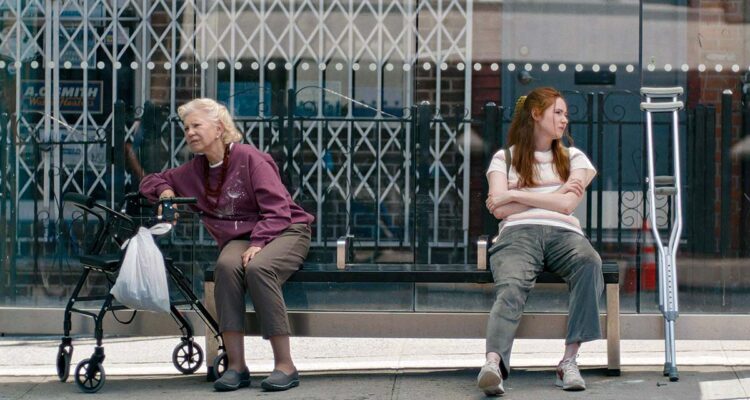In the dramedy Late Bloomers, Karen Gillen plays Louise, a flailing 28 year old going through the usual motions. You know the story – she’s just gone through a terrible breakup, her friends are desperately trying to help her, and all she needs is one life changing event for her to gain some self-awareness. While it might tread familiar territory, this movie is more than just the usual humorous youthful pratfalls. Lessons are learned by the end of the film, to be sure sure, but what we’re left with is a more realistic look at the messiness of mortality and the challenge of actually being present to one’s life rather than a simple coming-of-age story.
Directed by Lisa Steen and written by Anna Greenfield, the film finds Gillen’s Louise breaking her hip after an ill-advised attempt to get her ex’s attention. As the doctor points out, this type of break is usually only found in the elderly, resulting in all sorts of fatal complications. In order to heal, Louise must attend a rehab filled with octogenarians as she attempts to embrace the experience as a sign from the universe to get her life together. Along the way, she forms a contentious relationship with an ornery Polish woman named Antonina (played with simmering frustration by Margaret Sophie Stein) and, through a series of ridiculous decisions, finds herself placed in charge of her care. From here, the movie takes off, pitting these two characters not simply against one another but against themselves as they both navigate their fears of morality and the limitations of life.
To the film’s credit, it doesn’t simply rely on a youth vs. old age dynamic. By having Antonina’s character only speak in Polish, a lot of the processing comes from Louise having to work out what this other person’s needs are and what she can even give of herself. Even for the audiences, who are rarely given subtitles, the challenge becomes reflecting on the simplicity of human connection – body language, tone, the subtle hints that give away our fears and uncertainties even when we’re trying desperately to hide them away. This entire relationship is juxtaposed brilliantly not by Louise once again finding love (although there is a half hearted attempt at shoehorning that in, unfortunately) but by Louise coming to terms with her own mother’s debilitating experience of Alzheimer’s. Riddled with guilt from her inability to handle this reality, the film finds Louise making her way back home, not with answers, but with the messy uncertainty that true presence to life demands.
As a former health care attendant and current chaplain, I am particularly interested in the small moments of humility and humanity this creative team brings to the screen. The biggest laugh of the film comes from a scene where Antonina soils herself after proudly refusing to wear a diaper. As she attempts to help Antonina clean herself up, Louise goes through all the emotions one might have encountering this situation – from exaggerated disgust to desperate concern, Gillen and Stein nail this scene with applaudable subtlety. It is in moments like this, where the characters succumb to the tenderness of their situation and need for one another’s patient presence, that this film truly shines. While its not a perfect movie – again, despite a humorous attempt at a sex scene, the love interest bit takes time away from the real connection in the film – it does a wonderful job exploring how necessary, how confounding it is to discover one’s self through the care of another.
Throughout the film, it’s clear that both Gillen and Stein are having an absolute blast leaning into their characters. Gillen proves herself once again to be a masterful comedic actress, fully throwing herself into all the awkwardness and woundedness of Louise while Stein brings both great fire and subtle fear to Antonina’s rapidly waning life. It’s clear that this film was of great personal importance to Greenfield as she wrote it and the creative team honors this lovingly, offering audiences a simple but powerful gem of a movie.
